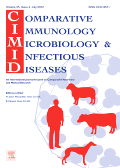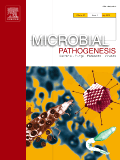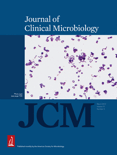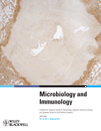
Journal of Pathogens
Scope & Guideline
Exploring Pathogen Interactions for a Healthier Future
Introduction
Aims and Scopes
- Pathogen-Host Interactions:
Research on the molecular and cellular mechanisms through which pathogens interact with host organisms, including studies on immune responses and pathogenicity factors. - Antimicrobial Resistance:
Investigations into the patterns of resistance exhibited by various pathogens, including the mechanisms of resistance and their clinical implications. - Infectious Disease Epidemiology:
Studies that examine the prevalence, distribution, and determinants of infectious diseases in populations, often focusing on specific demographics or geographic regions. - Innovative Therapeutics and Treatments:
Research that explores new therapeutic approaches, including herbal formulations and novel drug compounds, aimed at treating infections caused by resistant pathogens. - Clinical Microbiology:
Papers that provide insights into the diagnosis, treatment, and management of infectious diseases, particularly in vulnerable populations like pediatric or immunocompromised patients.
Trending and Emerging
- CRISPR and Genetic Editing Technologies:
The use of CRISPR/Cas9 technology in studying pathogen interactions and resistance mechanisms is gaining traction, indicating a trend towards advanced genetic tools in microbiological research. - Herbal and Alternative Therapeutics:
There is an increasing interest in exploring the therapeutic potential of herbal formulations and natural products, particularly in the context of antibiotic-resistant infections. - Infectious Diseases in Vulnerable Populations:
Research focusing on the impact of infectious diseases in vulnerable groups, such as refugees or immunocompromised patients, is emerging as a significant area of study, highlighting public health disparities. - Biofilm Formation and Resistance Mechanisms:
The exploration of biofilm production by pathogens and its implications for antibiotic treatment is becoming more prominent, reflecting a deeper understanding of chronic infections and treatment challenges. - Comprehensive Resistance Profiling:
There is a growing emphasis on comprehensive studies that assess both antimicrobial resistance and virulence factors, providing a more holistic view of pathogen behavior in clinical settings.
Declining or Waning
- Traditional Antibiotic Studies:
Research centered solely on traditional antibiotic efficacy without addressing resistance mechanisms or innovative treatment strategies has decreased, possibly due to the growing emphasis on understanding and combating antimicrobial resistance. - Non-Clinical Studies:
Papers focusing on purely theoretical or non-clinical aspects of pathogens without direct implications for treatment or public health have become less prominent, as the journal increasingly prioritizes studies with practical applications. - Vector-Borne Diseases:
There appears to be a waning focus on vector-borne diseases as the primary subject, as more recent publications have shifted towards bacterial and viral pathogens, particularly in the context of antibiotic resistance.
Similar Journals

COMPARATIVE IMMUNOLOGY MICROBIOLOGY AND INFECTIOUS DISEASES
Enhancing Understanding Through Comparative AnalysesComparative Immunology Microbiology and Infectious Diseases, published by Elsevier Science Ltd, is a prominent journal dedicated to advancing the fields of immunology, microbiology, infectious diseases, and veterinary sciences. Established in 1978, this journal has become a vital resource for researchers and professionals alike, with a commendable impact factor that reflects its significance in academia. The journal, available in both print and electronic formats (ISSN: 0147-9571, E-ISSN: 1878-1667), stands out for its commitment to disseminating innovative research findings, particularly through its categorization in Q2 and Q3 quartiles across various related disciplines as of 2023. The journal aims to provide insightful comparative analyses that enhance our understanding of host-pathogen interactions, immune responses, and disease manifestations. With a global readership base, it serves as a platform for collaborative discourse among scientists and professionals, ultimately contributing to the improvement of health outcomes worldwide.

Reviews and Research in Medical Microbiology
Unveiling Innovations in Infectious Disease ResearchReviews and Research in Medical Microbiology is a premier academic journal published by LIPPINCOTT WILLIAMS & WILKINS, focusing on groundbreaking research and comprehensive reviews that advance the understanding of medical microbiology. With an ISSN of 2770-3150 and an E-ISSN of 2770-3169, this journal serves as an essential resource for researchers, healthcare professionals, and students dedicated to the study of pathogens, infectious diseases, and microbial mechanisms affecting health. While the journal currently does not offer open access, its rigorous peer-review process ensures that only high-quality, impactful research is disseminated to the scientific community. The journal aims to bridge gaps in knowledge by presenting cutting-edge studies that explore novel therapeutic strategies, diagnostic methods, and the evolving landscape of microbial resistance. Nestled in the heart of Philadelphia, this journal proudly contributes to the advancement of medical microbiology and is an indispensable platform for the publication of critical findings that shape clinical practices and research trajectories in the field.

Infectious Diseases and Clinical Microbiology
Uniting scholars to combat infectious diseases worldwide.Infectious Diseases and Clinical Microbiology is a pivotal journal dedicated to advancing our understanding of infectious diseases through rigorous scientific research and clinical practices. Published by DOC DESIGN INFORMATICS CO LTD, this journal serves as a vital platform for researchers, healthcare professionals, and students keen on enhancing their knowledge of microbiological sciences and the clinical implications of infectious agents. With an ISSN of 2667-646X, it aims to disseminate significant findings in the field, enriching the scholarly dialogue surrounding infectious diseases. While currently operating under a traditional access model, the journal encourages global collaboration and knowledge sharing, striving to make a meaningful impact in tackling the challenges posed by infectious diseases. Its content aims to bridge the gap between laboratory research and clinical application, making it an essential resource in the contemporary landscape of global health.

MICROBIAL PATHOGENESIS
Driving Insights into Microbial Disease DynamicsMICROBIAL PATHOGENESIS, published by Academic Press Ltd - Elsevier Science Ltd, is a prominent journal in the fields of Infectious Diseases and Microbiology, with a notable impact factor and classified in the Q2 quartile for both categories as of 2023. Since its inception in 1986, this journal has provided a platform for the dissemination of cutting-edge research that enhances our understanding of microbial infections and their implications in health and disease. The journal is indexed in Scopus, ranking #80 among 344 in Infectious Diseases and #57 among 182 in Microbiology, underscoring its significant contribution to the scientific community. Although it operates under a traditional subscription model, the content is vital for researchers, professionals, and students focused on the dynamics of microbial pathogenesis and the development of innovative therapeutic strategies. The journal's comprehensive scope aims to foster advancements in this critical area of study, bridging the gap between laboratory research and clinical applications.

INFECTION AND IMMUNITY
Exploring the Nexus of Infection and Immune ResponsesINFECTION AND IMMUNITY is a distinguished peer-reviewed journal published by the American Society for Microbiology, focusing on groundbreaking research in the fields of infection, immunology, microbiology, and parasitology. Established in 1971, this journal has built a robust legacy, converging years of scientific discovery with a vision towards 2024 and beyond. With an impressive Impact Factor, the journal holds significant rankings in various categories; its Q1 status in both Infectious Diseases and Parasitology underscores its high relevance and quality within the scientific community. Researchers and professionals alike will benefit from its content, as it promotes the latest advances in understanding immune responses and infectious agents, further legitimizing its place among the top quartiles of its respective fields. Access options are provided through traditional subscription models, ensuring a broad charitable dissemination of knowledge. As a pivotal resource for scholars and practitioners alike, INFECTION AND IMMUNITY stands at the forefront of microbiological and immunological research, fostering essential discourse that is crucial for advancing public health and scientific insight.

JOURNAL OF CLINICAL MICROBIOLOGY
Transforming Knowledge into Clinical PracticeJOURNAL OF CLINICAL MICROBIOLOGY, published by the American Society for Microbiology, stands as a premier resource for researchers and professionals in the field of medical microbiology. With an illustrious history dating back to 1975, this journal has consistently provided high-impact research, reflecting its status in the Q1 category among microbiology (medical) journals, and an impressive Scopus rank of 14 out of 140, placing it in the 90th percentile. The journal's commitment to unveiling foundational and innovative studies greatly contributes to understanding human health challenges posed by microbial pathogens. Researchers can expect rigorous peer-reviewed articles that cover a spectrum of topics, from diagnostic methods to clinical epidemiology, fostering a deeper understanding of microbiology's role in healthcare. While this journal does not offer open access options, its substantial impact factor underscores its relevance in shaping the conversation in clinical microbiology. The JOURNAL OF CLINICAL MICROBIOLOGY is indispensable for anyone dedicated to advancing their knowledge and practical skills in microbiology.

Pathogens
Empowering Knowledge in Immunology and MicrobiologyPathogens is a leading open-access journal published by MDPI since 2012, dedicated to advancing the understanding of infectious agents and their interactions with hosts in the fields of immunology, microbiology, and molecular biology. Based in Switzerland, this journal plays a crucial role in disseminating high-quality research that spans from fundamental studies of pathogen biology to the implications for global health and disease management. With a commendable impact factor and prestigious Q2 rankings across multiple categories—including Immunology and Microbiology—Pathogens ensures visibility and accessibility for groundbreaking findings. The journal embraces the ethos of open access, allowing researchers, professionals, and students to access critical research anytime, facilitating a collaborative and innovative academic environment. By bridging the gap between research and application, Pathogens is instrumental in shaping the future of infectious disease research and management.

Mediterranean Journal of Infection Microbes and Antimicrobials
Innovating solutions for a healthier tomorrow.Mediterranean Journal of Infection Microbes and Antimicrobials is a distinguished open-access journal published by GALENOS PUBL HOUSE, dedicated to advancing the understanding of infectious diseases and microbiology. Since its inception in 2011, this journal has been a vital resource for researchers, professionals, and students interested in the intricate world of microbes and their impacts on human health. With its ISSN 2147-673X, the journal has progressively gained visibility, although it currently holds a Q4 ranking in multiple categories including Immunology and Microbiology, and Infectious Diseases for the year 2023. The journal operates from its headquarters in Istanbul, Turkey, and features a rich array of articles that contribute to the field’s body of knowledge. As a platform enhancing the accessibility of research, it invites submissions from global contributors to foster collaboration and innovation in tackling microbial challenges.

Infectious Microbes & Diseases
Elevating the discourse on infectious diseases and microbiology.Infectious Microbes & Diseases, published by Lippincott Williams & Wilkins, is a premier journal dedicated to the exploration and understanding of infectious diseases, microbiology, and epidemiology. With its focused scope and robust peer-review process, the journal aims to disseminate high-quality research that contributes to advancements in the field, making it an essential resource for researchers, healthcare professionals, and students alike. Established in 2019, it has quickly gained recognition, achieving a Q3 rating in categories such as Epidemiology, Infectious Diseases, and Medical Microbiology in 2023, and ranking in the top half of its field within Scopus metrics. Although currently offered as a subscription-based journal, Infectious Microbes & Diseases significantly enriches its disciplines by inviting innovative research and critical review articles, thus playing a vital role in combating the global challenges posed by infectious diseases.

MICROBIOLOGY AND IMMUNOLOGY
Exploring the Frontiers of Microbial and Immune ScienceMICROBIOLOGY AND IMMUNOLOGY, an esteemed journal published by WILEY, serves as a vital resource for researchers and professionals in the fields of microbiology, immunology, and virology. With its ISSN 0385-5600 and E-ISSN 1348-0421, this journal has been a cornerstone in scientific literature since its inception in 1977, bridging decades of research and innovation through its comprehensive coverage of emerging trends and discoveries. Although this journal operates without open access, it maintains a commendable presence in academic circles, reflected in its 2023 Quartile rankings of Q3 across the categories of Immunology, Microbiology, and Virology. As part of an important discourse in these disciplines, MICROBIOLOGY AND IMMUNOLOGY ensures its scholarly contributions are relevant to both seasoned researchers and emerging scholars. Positioned in a competitive journal landscape, with Scopus ranks indicating a median percentile across its fields, it remains committed to advancing knowledge through peer-reviewed articles, thereby supporting the continuous evolution of its focus areas. The journal's current scope encompasses topics critical for understanding pathogen-host interactions and the immune response, making it a crucial publication for any academic library or individual scholar dedicated to the biological sciences.